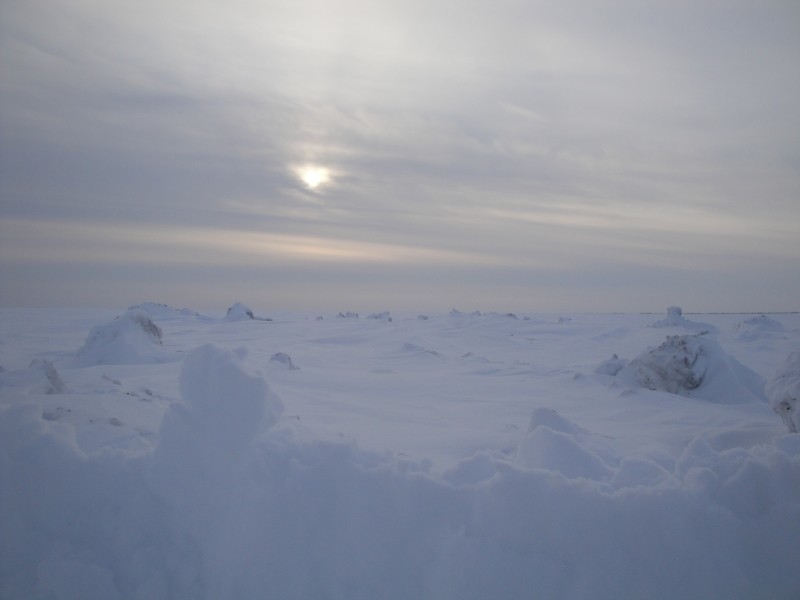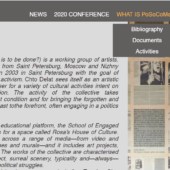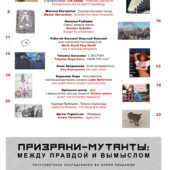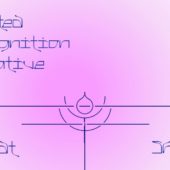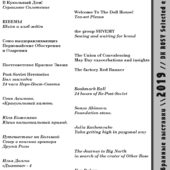Short Description of the Courses
1) Post-Soviet Sexuality
The course on psychoanalysis
The course is devoted to the study of the psychoanalytical approach to sexuality and the application of this optics to the analysis of cultural phenomena of post-Soviet society. Within the framework of the course, the post-Soviet period is considered as a unique moment of moral freedom, when Soviet morality has already collapsed and a new bourgeois one has not yet formed, and a new “body” of society has emerged, not yet sexually signified, not labeled.
Leading:
Elena Kostyleva, graduate student of the program “Socio-Political Philosophy” EUSP) and Valeria Levchuk, graduate student of the program “Socio-Political Philosophy” EUSP)
2) Theoretical and applied hauntology
Moderator: Maxim Evstropov
Hauntology is an interpretive translation of the term “hontology” (French hantologie), coined by Jacques Derrida to refer to a certain “science” of ghosts, and, thanks to the unpronounceable “h” in French, which sounds almost like “ontology”, i.e. theory of being. Subsequently, thanks to Mark Fisher, the phrase “hauntology” began to be applied to various cultural practices, denoting either style or technique (in music, cinema, theater, etc.), and often turning into a characteristic of modernity – how time has survived its own future.
In a short course on hauntology, we will focus on various aspects of phantoms (ontology and criticism, semiotics and aesthetics, ethics and politics of ghosts), on the role and place of a ghost in a local (post-Soviet) situation, and also ask how to deal with ghosts and to “ghost” now.
Maxim Evstropov – artist, musician, philosopher. Member of the group, Rodina (Homeland), engaged in experimental political art (2013–2018), founder of the Party of the Dead. Candidate of Philosophy, Associate Professor, Specialist in French (Post) Phenomenology, author of the book “Experiences of Approaching the “Other ”: Bataille, Levinas, Blanchot.”
3) Post-Soviet Condition: Reactionary Time in the Haunted Space
Moderator: Marina Simakova
After the Cold War ended, the world stepped into an era of changes promising new forms of coexistence to be invented. This did not happen, regardless all political transformations, economic shifts and technological breakthroughs. On the contrary, the past which was discarded and negated became a universal point of reference and a territory for the on-going battle of ideas and ideologies. Today, history is instrumentalized, and serves either as a reservoir of inspirational achievements, or as a container of dreadful images. Contemporaneity is haunted by longing for greatness, nostalgia and melancholy, which paralyzes our futuristic imagination and social experiment. The process of fetishization of ruins, or “ruin-porn”, which makes culture reactive or even reactionary, largely determines the post-Soviet condition in arts, tourism and daily life. During this course, we will focus on the post-Soviet condition as a complex and quasi post-apocalyptic phenomena, and outline both critical and positive strategies for its conceptualization. The course consists of four lectures, each thematizing an element of the post-Soviet condition (culture, politics, economy, history) through a respective apocalyptic figure from the book of Revelation: Wasteland (Death), War (War), Market (Famine) and Time (Conqueror).
Marina Simakova is a researcher in social and political thought and a theorist. Her key interests are the philosophy and intellectual history of socialism. In her current project, she provides a historical and philosophical groundwork for the concept of political reaction in light of the radical theory that emerged in early 20th century France, Italy and pre-revolutionary Russia.
4) Practices of savvy in intellectual and artistic production
Moderator: Mikhail Kurtov
Savvy is a Russian word etymologically associated with the Latin “meditation” (both go back to the primitive Indo-European root * med / * mek). Savvy can be considered as an eastern branch of the thought of the activity of the “measuring mind”: the western dimension of reflection is opposed to a quick grasp of the essence of the matter. The practices associated with this word-concept have a pronounced collectivist dimension, which is shown by the popular Soviet games “What? Where? When?” and the “Club of Gay and Inventive”, based on the ability of savvy and differing from their individualistic Western counterparts – television quiz and stand-ups.
The purpose of the mini-course is to look at the tactics and strategies of thinking that are characteristic of Soviet and post-Soviet intellectual and artistic production, through the prism of the notion of savvy: from Kuryokhin’s performances and the activities of the New Academy to media activism and hacktivism of the 2010s. The maximum task is to develop new (or, rather, regain old) ways of collective interaction and formulation and solution of urgent problems.
Mikhail Kurtov – philosopher, candidate of philosophical sciences. Author of books “Between Boredom and Dreaming. Film experience analytics ”(2012),“ Genesis of the graphical user interface. To the theology of code ”(2014). Laureate of the Andrei Bely Prize (in the nomination “Humanitarian Studies”, 2016).
5) AESTHETIC KINSHIP
Moderators: Anastasia Ryabova and others.
In this course, we offer to develop kinship between seemingly incongruous concepts. Together with a research group we will dismantle the notorious dichotomy of your own \ alien, we will turn unique aesthetic languages inside out, touch the boundaries between various worlds. Traditionally, when we think about aesthetic kinship in art history discourse, we talk about an influence of one author/tradition/genre on another. We will try to transfer this paradigm to different spheres of political daily routines which are divided by administrative boundaries, social conventions, etc., and we will return to art on new political grounds.
List of possible guests (discussed): Nikolay Smirnov, Vita Zelenskaya, Maria Bikbulatova, Intimnoe Mesto, etc.
Anastasia Ryabova: Moscow based artist, educator, researcher. She is an initiator of the exhibition, publishing and educational projects, author of critical essays on contemporary art and architecture. Builder of unplanned Star Road (2013 – ). Initiator and editor of the brochure about city and political math Problem Book (2013). Author and keeper of the Artists’ Private Collections archive (2010 – ). Curator of the exhibition False Calculations Presidium (2012). One of the creators of e-shop megazine.biz (2009). One of the founders of the Night Movement (2015 – ). Participant of the exhibition action >10 (2013). Сo-author of art-manual Introduction into profession-XXI century (2017). Сo-author of brochure based on co-called course “Politics of Drawing” (2019).
6) Forms and practices of post-Soviet collectivity in art and politics
Moderator: Roman Osminkin
The course is aimed at searching and analyzing alternative forms of collective cultural production that arose under the post-socialist conditions of almost complete discredit and lack of collectivity. In the incomplete three decades after the collapse of the USSR, the forms of cultural production and consumption in the post-Soviet space have undergone a number of paradigm changes related to both a change in the political formation and global trends in culture.
Our goal is to identify and track how, over the past three decades, artists, poets, activists and participants in different grassroots movements have created some form of collective interaction: creativity, protest, (self) education, challenging the dominant corporate forms of state and oligarchic institutions, and apolitical commercial models of creative industries.
Roman Sergeevich Osminkin: art theorist, poet, performer, media artist, art critic, curator. Member of the Union of Writers of St. Petersburg since 2007. Member of the editorial board of the Translit magazine and the online portal Krapiva, ideologist and vocalist of the musical project TECHNO-POETRY.

